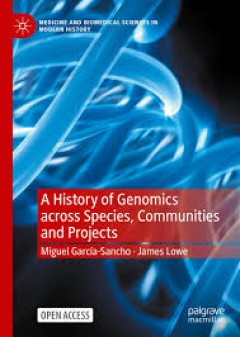Filter by

A History of Male Psychological Disorders in Britain, 1945-1980
This book is open access under a CC BY license and explores the under-researched history of male mental illness from the mid-twentieth century. It argues that statistics suggesting women have been more vulnerable to depression and anxiety are misleading since they underplay a host of alternative presentations of 'distress' more common in men.
- Edition
- -
- ISBN/ISSN
- 978-1-137-44888-0
- Collation
- 215 hlm
- Series Title
- -
- Call Number
- -

A History of Intelligence and 'Intellectual Disability' : The Shaping of Psyc…
Starting with the hypothesis that not only human intelligence but also its antithesis 'intellectual disability' are nothing more than historical contingencies, C.F. Goodey's paradigm-shifting study traces the rich interplay between labelled human types and the radically changing characteristics attributed to them. From the twelfth-century beginnings of European social administration to the onse…
- Edition
- -
- ISBN/ISSN
- 9781315564838
- Collation
- 392 hlm
- Series Title
- -
- Call Number
- -

A History of Genomics across Species, Communities and Projects
This open access book offers a comprehensive overview of the history of genomics across three different species and four decades, from the 1980s to the recent past. It takes an inclusive approach in order to capture not only the international initiatives to map and sequence the genomes of various organisms, but also the work of smaller-scale institutions engaged in the mapping and sequencing of…
- Edition
- -
- ISBN/ISSN
- 9783031061301
- Collation
- 380 hlm
- Series Title
- -
- Call Number
- -

A History of Force Feeding : Hunger Strikes, Prisons and Medical Ethics, 1909…
It is the first monograph-length study of the force-feeding of hunger strikers in English, Irish and Northern Irish prisons. It examines ethical debates that arose throughout the twentieth century when governments authorised the force-feeding of imprisoned suffragettes, Irish republicans and convict prisoners. It also explores the fraught role of prison doctors called upon to perform the proced…
- Edition
- -
- ISBN/ISSN
- 9783319311135
- Collation
- 267 hlm
- Series Title
- -
- Call Number
- -

A History of Education for the Many : From Colonization and Slavery to the De…
The East Baltic languages are well known for their conservative phonology as compared to other Indo-European languages, which has led to a stereotype that the Balts developed in isolation without much contact with other speech communities. This book challenges that view, taking a deep dive into the East Baltic lexicon and peeling away the layers of prehistoric borrowings in the process. As well…
- Edition
- -
- ISBN/ISSN
- 9781350215160
- Collation
- 232 hlm
- Series Title
- -
- Call Number
- -

Advances in Automated Driving Systems
Electrification, automation of vehicle control, digitalization and new mobility are the mega-trends in automotive engineering, and they are strongly connected. While many demonstrations for highly automated vehicles have been made worldwide, many challenges remain in bringing automated vehicles to the market for private and commercial use. The main challenges are as follows: reliable machine pe…
- Edition
- -
- ISBN/ISSN
- 9783036545042
- Collation
- 294 hlm; ill., lamp.,
- Series Title
- -
- Call Number
- -

Advances in Asphalt Pavement Technologies and Practices
Unlike other construction materials, road materials have developed minimally over the past 100 years. However, since the 1970s, the focus has been on more sustainable road construction materials such as recycled asphalt pavements. Recycling asphalt involves removing old asphalt and mixing it with new (fresh) aggregates, binders, and/or rejuvenators. Similarly, there are various efforts to use a…
- Edition
- -
- ISBN/ISSN
- 9783036554938
- Collation
- 322 hlm; ill., lamp.,
- Series Title
- -
- Call Number
- -

Advances in Artificial Intelligence Methods Applications in Industrial Contro…
The motivation for the present reprint is to provide an overview of novel applications of AI methods to industrial control systems by means of selected best practices in highlighting how such methodologies can be used to improve the production systems self-learning capacities, their overall performance, the related process and product quality, the optimal use of resources and the industrial sys…
- Edition
- -
- ISBN/ISSN
- 9783036568096
- Collation
- 150 hlm; ill., lamp.,
- Series Title
- -
- Call Number
- -

Advances in Applied Marine Sciences and Engineering
In recent years, applied marine sciences and engineering has attracted worldwide attention, which includes basic theoretical research and applied research on marine hydrology, meteorology, physics and geology. Besides, new viewpoints, new developments, new theories, new methods, new applications and new experiences of investigation, research and management in the marine environment and big data…
- Edition
- -
- ISBN/ISSN
- 9783036582092
- Collation
- 288 hlm; ill., lamp.,
- Series Title
- -
- Call Number
- -

Advances in Antiferromagnetic Spintronics
Antiferromagnetic spintronics is an emerging topic in spintronics that is attracting interest due to its wide range of advantages, including terahertz operation, memory without stray fields, and highly efficient spin generation. The discussion of this topic covers aspects ranging from the development of new antiferromagnetic materials to the applications of these materials in devices. Tradition…
- Edition
- -
- ISBN/ISSN
- 9783036537504
- Collation
- 82 hlm; ill., lamp.,
- Series Title
- -
- Call Number
- -
 Computer Science, Information & General Works
Computer Science, Information & General Works  Philosophy & Psychology
Philosophy & Psychology  Religion
Religion  Social Sciences
Social Sciences  Language
Language  Pure Science
Pure Science  Applied Sciences
Applied Sciences  Art & Recreation
Art & Recreation  Literature
Literature  History & Geography
History & Geography